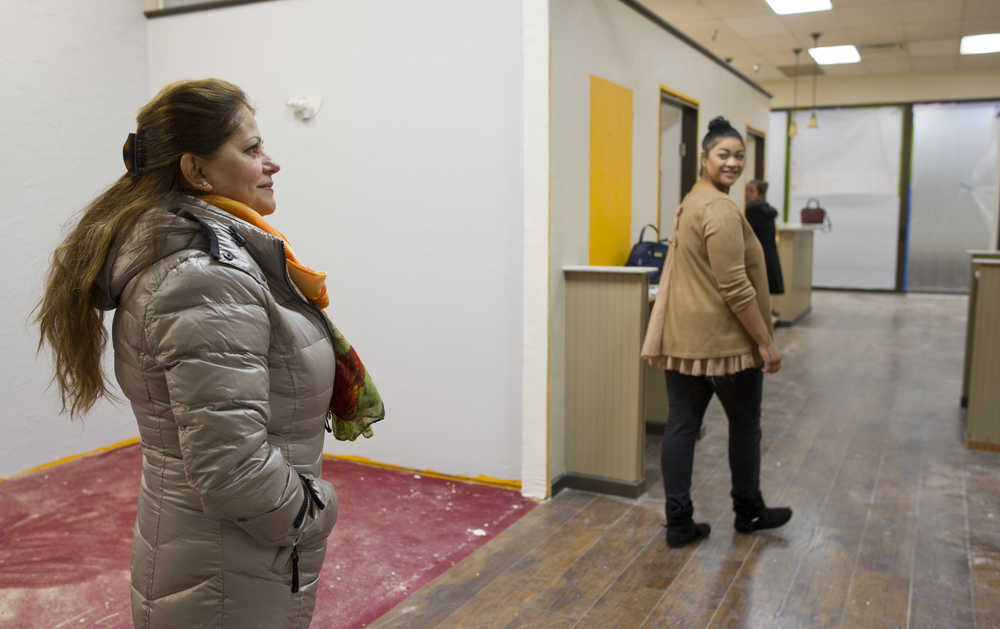Shamila Scalf is hoping to ease Juneau’s child care shortage a bit by opening a new child care center in the Mendenhall Mall. On Wednesday, she was painting the walls a light grey color. Animals, birds and trees will come next.
“It’s almost ready. The application is sent to licensing. The fire marshal — he’s already done. So we are pretty much there. We’re aiming for Nov. 1,” Scalf said on the phone Wednesday.
This will be Scalf’s second child care center. She opened Little Feet Childcare Facility at Aldersgate United Methodist Church in July 2015, which currently serves 30 infants, toddlers and pre-school children. With the new location, Scalf will be able to accept an additional 25 infants and toddlers.
“I get phone calls every day for spots. ‘Do you have a spot?’ A lot of moms that are pregnant give us a call and reserve a spot. I have a mom due in October, one due December and one due April. They’re planning ahead, and I am very pleased I can provide this service for them,” she said.
[Child care crisis discussion gains focus]
Scalf’s new child care center will add to the growth of licensed child care spots Juneau has seen in the past year. Between July 2015 and July 2016, the capital city gained 81 spots bringing the total up to 476, said Joy Lyon, executive director of the Association for the Education of Young Children, Southeast Alaska.
“That’s the first time in five years that we’ve seen an uptick, so we’re going in a positive direction, whereas over the past five years, we’ve seen a downward trend every year. We’re not quite back up to where we were in 2011, but this is a very promising increase,” Lyon said during a recent interview.
“Eighty-one new spots means 81 more people can work and raise their families here,” she added. Anecdotally, Lyon has heard about families leaving Juneau due to lack of child care and the high cost of living.
Part of the growth came from the opening of the Juneau School District’s Montessori Borealis Children’s House for 3- to 5-year-olds and the Gehring Nursery School, run by Israa Kako-Gehring. Lyon said the nursery school was able to operate due to the City and Borough of Juneau relaxing zoning laws.
“She wouldn’t have been able to open without the zoning change,” she said.
[Measure to ease establishment of home daycare centers advances from Assembly committee]
Lyon said CBJ amending its land use code was a game changer. It’s also helped support the opening of more family child care group homes, which are in-home programs serving between eight and 12 children.
“Before the zoning change if you wanted to go from eight children to nine children or up to 12 children, you had to go through the conditional use permit process with the city, which was costly and time consuming and just a burden for the programs. It was not very accessible, whereas now they still have to fulfill some requirement with the state of Alaska to increase from eight to 12 children, but they’re able to do that without having the extra layer of the city zoning and conditional use permits,” she said.
[Child care boost passes Assembly]
Other factors that have contributed to the growth of licensed child care spots include AEYC’s $1,000 startup grants for new programs. Most in-home care is comprised of family child care programs, which is for eight or less children and requires only one adult.
“We really support people considering that if they’re going to be taking a year off anyway, just take a few more children,” Lyon said. She understands taking a few more children is a big step, “but we can help them make that possible, help them through all the steps.”
Another factor is the HEARTS initiative, which stands for Hiring, Education, and Retaining Teaching Staff, and is a collaboration between several Juneau agencies. The initiative provides education and wage incentives to encourage child care teachers to stay in the field.
“The average Juneau child care wage is about half of the average Juneau wage and less than half of the average kindergarten salary,” Lyon said.
The average wage for a child care teacher in Juneau is $26,600 while an average kindergarten teacher salary in Juneau is $69,730, according to data compiled by AEYC.
While the 476 licensed child care spots Juneau had in July is promising, it’s still far from meeting the need. The city has almost 2,500 kids under kindergarten age. Many of these children are with a stay-at-home parent or in unlicensed child care situations.
“Parents just juggle to make it work for those few years, especially for the infant and toddler years. Once you have a preschooler, it’s possible to find a preschool spot. But for infants and toddlers, it’s like one space for every 10 children,” Lyon said.
“We still need basically an elementary school’s worth of child care spaces to serve the needs,” she said. “What we need is a large center.”
Lyon has visited large child care centers in Anchorage and Seattle. She said employers in Juneau can collaborate and work together to develop one.
Shamila Scalf, owner of Little Feet Childcare Facility, wants to see the same thing. She’s worked in a center that had 150 children.
“My vision is for Juneau to have a center like that. Little babies can start with us from when they’re zero and they can grow with the same providers, the same teachers, the same people,” she said. “I’ve seen the greatness of the center. I’m seen how providers, caregivers and children love to be in the same center for years and years.”
• Contact reporter Lisa Phu at 523-2246 or lisa.phu@juneauempire.com.
Read more news:
Assembly candidates talk the road, senior sales tax and diversity
Mark Begich rules out write-in campaign for U.S. Senate
Council nominates two Juneau lawyers for district judge seat

